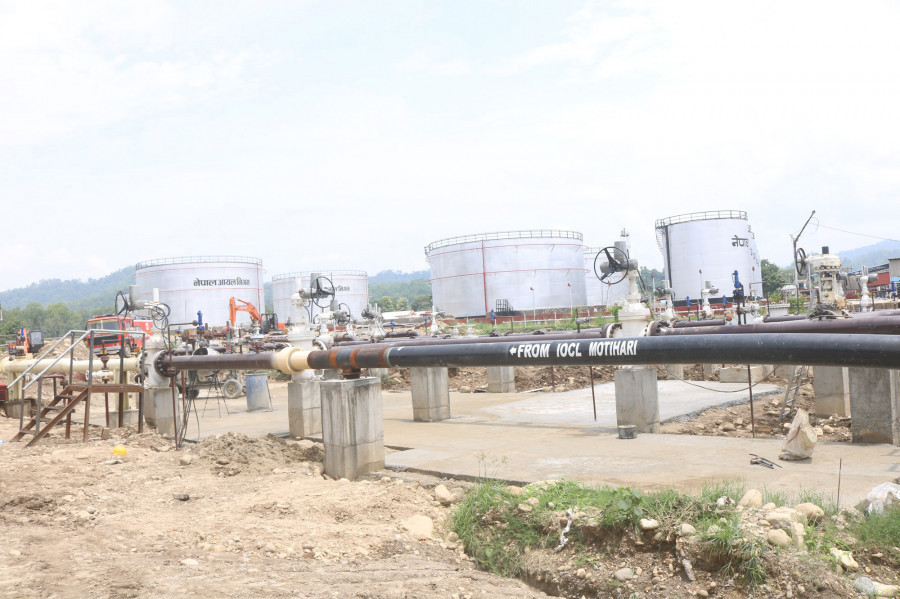Money
Second cross-border petroleum pipeline project in Jhapa moves a step closer
An Indian delegation will arrive next week for a field study of the proposed 50km pipeline, officials say.
Krishana Prasain
The plan to develop the second cross-border petroleum pipeline has moved a step closer as a delegation from the Indian Oil Corporation is scheduled to arrive in Nepal to make a field study before finalising the detailed project report.
According to Nepal Oil Corporation, the Indian delegation will arrive on January 11 and make a field study of the pipeline connecting Siliguri in India and Duwagadi in Jhapa. The Indian survey team has already finalised the Siliguri-Jhapa route where pipes will be laid.
According to Surendra Poudel, executive director of the corporation, the initial survey has shown that 35 km of pipeline will be laid in the Indian territory, and 15 km in the Nepal side.
The pipeline project has moved ahead taking into consideration the demand for oil until 2034, he said.
“The detailed project report will be prepared by the mid-April next year,” Poudel said.
The meeting of joint secretary-level Nepal-India Joint Working Group on cooperation in oil and gas sectors held in New Delhi, India in January 2020 had decided to construct the petroleum pipeline project at Nepal’s request.
Province 1 will also have an oil storage plant with a capacity of 40,000 kilolitres that can stock fuel for 90 days.
Nepal Oil Corporation has hired an international consultant to prepare study for the construction of a storage plant of liquified petroleum gas, also known as cooking gas, and gas bottling plant in Jhapa.
The capacity of the cooking gas storage plant will be 4,000 tonnes. Both the petroleum and gas storage plants are being constructed in Duwagadi, Jhapa where the corporation has 28 bighas (7 hectares) of land.
The delegation will also visit the site of a cooking gas storage facility, said Binitmani Upadhyaya, spokesperson for Nepal Oil Corporation.
“The detailed project report will assess the investment and other technical details of the pipeline in Jhapa,” said Upadhyaya.“After that, the Indian delegation will visit Amlekhgunj oil depot in Bara as plans are to extend the oil pipeline to Lothar, Chitwan.”
The corporation said that the second phase of 69-km Motihari-Amlekhgunj petroleum pipeline, which is currently supplying diesel, is also about to commence.
“The Nepal Oil Corporation plans to construct two vertical oil tanks with a capacity of 2.2 million litres. A modern depot or a smart oil terminal will also be constructed,” said Upadhyaya. “The technical aspect of the project will be assisted by the Indian Oil Corporation. It will also provide training to our [Nepal Oil Corporation] manpower.”
According to the oil utility, it plans to construct an advanced aviation fuel depot at Gautam Buddha International Airport, Bhairahawa. It has already started a diesel storage tank in Pokhara.
Construction of two aviation fuel storage tanks with a capacity of 30,000 liters has also started in Bhadrapur airport, it said.
The corporation is planning to build oil storage tanks at airports of Dang, Simara and Manthali, where fuel has to be supplied through oil tankers.
The construction of petroleum storage plants in the number of provinces will help to keep a minimum stock. The buffer stock will help ease supplies when shortage appears, Poudel added.
In September 2018, Prime Minister KP Sharma Oli and his Indian counterpart Narendra Modi jointly inaugurated the Nepal-India cross border petroleum pipeline, the first in South Asia.
The 69-kilometre-long pipeline transports fuel from India’s Barauni refinery in Bihar to Amalekhgunj in Nepal. Of the 69 kilometres, 36 kilometres of the pipeline is on the Nepali side and the rest on the Indian side.
According to the Trade and Export Promotion Center, the country imported petroleum products of Rs35 billion in the first four months of the current fiscal year, a decline of 38.9 percent compared to the same time period last fiscal year. India fulfils all of Nepal's petroleum requirements.
Last fiscal year, due to the Covid-19 pandemic that forced almost all vehicles off the road, Nepal’s fuel import bill dropped to Rs164 billion, from Rs216 billion in the previous fiscal year, 2018-19.




 17.15°C Kathmandu
17.15°C Kathmandu













